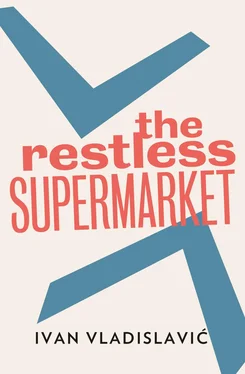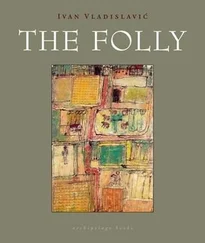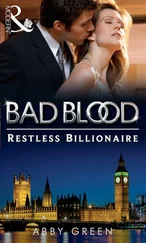The rest of the evening was a sequence of absurd charades about the newcomer and his history, with a Magyar soundtrack courtesy of Mevrouw Bonsma. Istanbul was Constantinople, now it’s Istanbul … Trust Merle to proffer an atlas, on which he was able to point out his island of origin in the Adriatic, a place devoid of vowels, and then to describe in a dotted line of greasy fingerprints left floating in his wake like oil slicks on the surface of the paper, his passage to our shores, while Spilkin said, ‘Ja, ja,’ as if he had confessed to being a German. Bogey seemed extraordinarily interested in the keys to the maps, the tuffets for prairies, the puffs of green popcorn for rainforests, the sutures for railway lines. In the middle of this performance, he changed seats with Spilkin, so that he and Merle could look at the new world from the same vantage point. Then they pored over the tidal charts at the front of her diary, as a month of crescent moons waxed and waned under his fingernails, and fumbled their way through lists of public holidays and the months of the year. I would have gone home then, had she not taken his rude forefinger and used it as a pointer to pick out the syllables: January. February. March.
‘April, May … June, July,’ Spilkin hummed. A folk song.
Regretfully, there was no ‘Slobodan’ in the Better Baby onomasticon.
I waited until well past my bedtime for him to take his leave, so that I might speak plainly, but he did not go. It was more consideration than he deserved, seeing that he didn’t understand a word we were saying. Finally I said to Merle: ‘You’ve done your good turn. But don’t encourage him too much. We don’t want this to become a habit.’
‘Why do you say that?’ She sounded genuinely surprised.
‘It won’t be comfortable with him around. He’s uncouth. And not much of a conversationalist.’
‘Well of course not, he doesn’t speak the language.’
‘Exactly. He won’t be able to keep up his end. Our discussions will be lopsided. You’ll have to get it across to him that he’s not welcome here.’
‘I’ll do no such thing.’
‘I don’t mind him coming to the Café, you know, he’s a welcome new splash against our famous cosmopolitan background. But I’d rather not have him at my table. He could join us again one day when he’s picked up a few words of English.’
‘Aubrey, how could you! He’s just a stranger in a strange city, looking for a bit of company. And he seems like a nice person.’
‘Nice?’ I looked to Spilkin for support, but he pulled a mouth. ‘Alliaceous is more like it.’
‘Who?’
‘Oniony-garlicky. From the Latin allium . I feel like I’m downwind of a saveloy, something full of hickory smoke and paprika. Look at his hands. He’s altogether too sausagey, of finger and breath.’ He smelt of change, to tell the truth, but I did not say so.
‘Of all the unkind things,’ said Merle.
‘I regret that you have now taken the cake,’ said Mevrouw Bonsma.
Whereupon the four-flushing topic of conversation, who had been gazing from one of us to the other with an eager smile on his face, doffed the shiny hat from his knee. The kneecap was like a skull embedded in cement.
We could have called him Boguslavić, by analogy with Tearle and Spilkin. It was not that difficult to master, especially when you saw it written down. I made a spirited defence of the principle, but to no avail. He himself badly wanted to be ‘Dan’, but an English label would not stick to such greasy goods. In the end, we called him Bogey. He would tell people — once he’d acquired the language − that it was because of his resemblance to Humphrey Bogart. When he leant on the piano, he said, with the brim of his hat aslant and the ceiling fan flicking shadows over his stubble, you would swear you were in Casablanca.
I would tell people to look it up in the Oxford . Bogey, noun, ‘an awkward thing or circumstance’. Or even, forgive the vulgarity, ‘ slang , a piece of dried nasal mucus’.
*
The winds of change smelt, thanks to Bogey, like an osso bucco — a shin of veal containing marrowbones stewed in wine with vegetables. But the fact is, I needed no olfactory clues to the way the winds were blowing. The eye, sharp as ever, had it before the nose.
An era was ending. And without sounding my own cornetto, I think I can say that I saw it coming before anyone else in the Café Europa, and possibly in the whole of Hillbrow (although I wouldn’t lay claim to more territory than that).
A large part of my working life had been devoted to the proofreading of telephone directories, and specifically the Johannesburg Book. Quite apart from the technical challenges of the task, which I’ve already described, although they’re probably beyond the layman, there were unique insights to be gained into the city and the ways of its inhabitants. Initially, in my apprenticeship, I was struck by the obvious oddities: the Cook who lived in Baker Street, the Towers of Brixton, the Blairs of Blairgowrie, the Blacks of Blackheath. The Heaths, too. No Gowries, mind you, praise be. I compiled a few amusing lists along these lines, passing fancies. But as my eye matured, I began to notice subtler things, submerged reefs beneath the placid surface, patterns that only came into focus when one had squinted until one’s eyes watered. I noticed, for example, a preponderance of Baums and Blooms in Cyrildene; and likewise of Pintos and Pinheiros in Rosettenville; and of Le Roux in Linmeyer. Fully eleven per cent of the Van Rensburgs in the Book of 1973 had settled in Florida, whereas eight per cent of the Smiths, of whom there were more than four hundred, were in Kensington. By contrast, there were only three Schlapoberskys, and they were all in Oaklands. A small mercy, some might say. Don’t suppose that I was obsessed with ethnic groups — the concentration of medical men in Hurlingham, for instance, struck me with equal force — but it is in the nature of surnames to conceal age, status and sex, and reveal race.
With experience, my perceptions sharpened further, and I began to notice not just the patterns within directories, but the changes from one directory to the next, the slight shifts in emphasis and secret movements that only a comparison over time would uncover. I could tell that business was booming in Cleveland and dying out in Jeppestown, thanks to the new motorway. Without ever setting foot in Jules Street, I saw that it was becoming the used-car centre of the city. I saw that the head offices of the big businesses — the manufacturers, the insurance houses, the retailers, and their touts in the advertising agencies — were moving from the city centre to Rosebank and Sandton. I saw new suburbs rise from the veld — Lonehill, Mondeor, Amoroso — and old ones fall into decay — Doornfontein, Bertrams, Vrededorp — and then rise again, occasionally, in a flurry of restaurants and antique shops. Sometimes I saw the tracks of vast processes, generations on the march from poverty to wealth, Völkerwanderungs , exoduses, archaeological flows — and then I wished that I had turned my attention to directories as a younger man and kept comprehensive records.
In the twilight of my career, some intriguing trends became apparent in the Book, signs of the momentous changes that lay in store for the city and the country, glimmering between the lines, if one had eyes to see them, even before they became visible in the world.
Take the influx of Moodleys and Naidoos into Mayfair. I had been a proofreader of telephone directories long enough to have observed the steady relocation of these very surnames from Fordsburg and Pageview to Lenasia (or from Frdsbrg and Pgvw to Lns, as the crude abbreviations foisted upon us had it). The fact that they were flowing back into the city fascinated me. There were more of them every year. And it soon became clear, to this latterday Canute, that the tide would not be turned. An historic migration was afoot, comparable to the great scattering of the tribes before Chaka, the King of the Zulus.
Читать дальше












